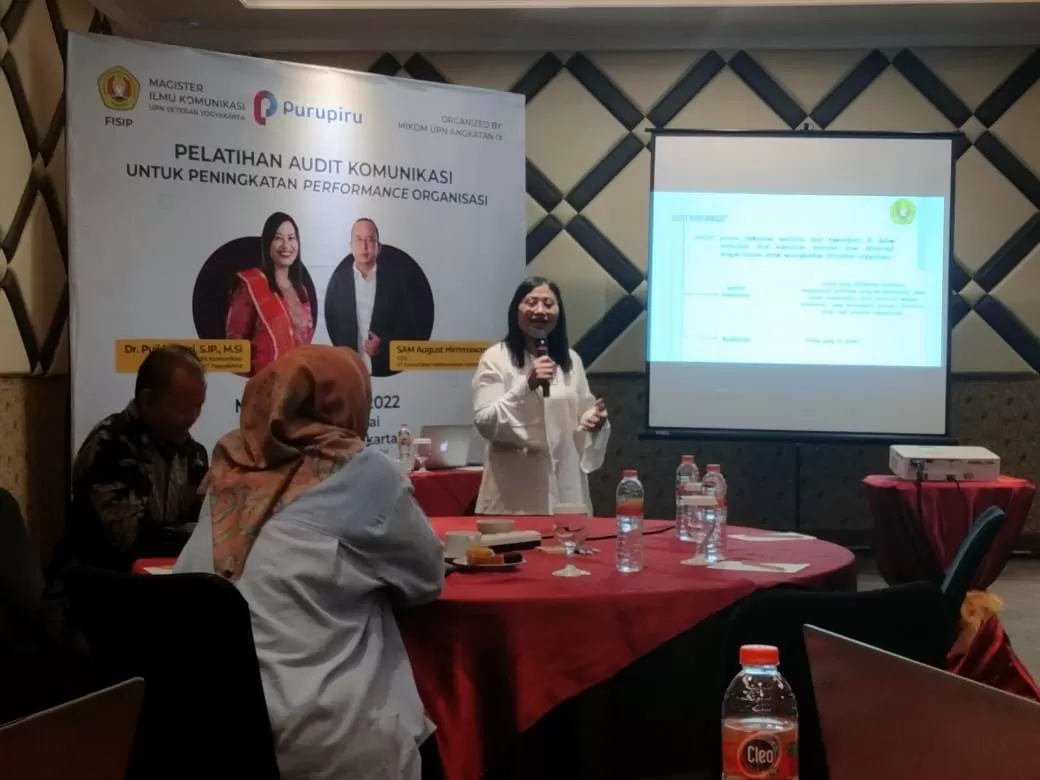UPN Veteran Yogyakarta’s Master of Communication Studies Programme (MIKOM UPNVY) held a Communication Audit training, at one of the well-known hotels in the Special Region of Yogyakarta, Sunday (19/206/2022). With the theme “To Improve Organisational Performance”, it was attended by dozens of MIKOM UPNVY class IX students.
The Head of MIKOM UPN Veteran Yogyakarta, Assoc Prof Dr. Edwi Arief Sosiawan, S.IP., M.Si, CIIQA, CIAR, who opened the Communication Audit training activities, expressed his appreciation to the organiser, the lecturer of the Communication Audit course, Dr. Puji Lestari, S.IP., M.Si.
As well as, to PT Komunikasi Keberlanjutan Indonesia, a company that has been poor across the country as a Communication Audit consultant, Sam August Himmawan as CEO was present as a training resource person. “We hope that students who are participants can capture ideas from the Communication Audit training activities, for example as a thesis theme,” said Edwi Arief Sosiawan.
In fact, the Head of MIKOM UPNVY said that many of his students are entrepreneurs. So, he hopes that after the training activities, participants can also get opportunities to create new business fields in the field of Communication Audit.
“For those who are interested, after graduating, they can open a company or become a Communication Audit consultant. Even now, many undergraduate students are becoming entrepreneurs, so the extension class is more popular,” he said.
“Tomorrow, Mas-Mas and Mbak-Mbak will have younger siblings who are not playing games. There are those from Morocco and Egypt,” added Edwi Arief Sosiawan, an academic known as the Manager of the UPNVY Karate Team.
Meanwhile, MIKOM UPNVY Communication Audit course lecturer, Puji Lestari, explained why training is needed, because students must be equipped with real practice, not just theory.
“Skills lessons must have practice, so that students can experience firsthand how to become a Communication Audit practitioner, perhaps one day someone will be interested in this profession,” she explained.
According to Puji Lestasi, it is very important to combine organisational functions with communication auditing, likening it to blood flow in the body.
Puji Lestasi continued, the gap or “miscommunication” is a crucial thing that must be handled as soon as possible in every organisation.
“Students must know the steps of the Communication Audit stage, from planning, formulating costs, to ways to get jobs to win tenders,” she said.
As a lecturer of Communication Audit, Puji Lestari expects her students to be able to analyse organisations, identify problems, diagnosis, planning, communication patterns, implementation, to be able to provide recommendations and policy socialisation.
“In the future, the plan is to open a certification institution for prospective Communication Audit Consultants. I used to formulate this matter at the Ministry of Communication and Information. The PR challenge is that there are not many auditors in the field,” she added.
Puji emphasised that academics can act as consultants. However, the provision is that Communication Audit practitioners (auditors) must hold competency certification issued by the Professional Certification Agency (LSP). Where, the existence of LSP must be recognised by the National Professional Certification Agency (BNSP).
“Auditors in the communication audit process, accesor activities are supervised by the National Accreditation Board of Higher Education (BAN-PT),” he said.
“The audit will find out any obstacles in delivering messages in an organisation (teamwork evaluation). Because sometimes companies don’t have SOPs, the communication audit can help them to formulate them based on the data obtained from the research conducted,” Puji continued.
CEO of PT Komunikasi Keberlanjutan Indonesia, Sam August Himmawan, in his presentation explained the importance of a Communication Audit in government institutions to corporate organisations. He conveyed it based on experience, so that what the participants were not equipped with text book knowledge alone. According to him, the important thing in a Communication Audit is that the consultant or practitioner understands the stakeholder mapping of the organisation or client.
“Not only that, in the communication audit process, the practitioners must be able to pay attention to the client’s culture. Auditors must be accepted, understood, given feedback, followed up according to the expectations of the communicator, and also determine the priority scale,” said Sam.
Communication Audit practitioners must be able to provide practical ways as operational effectiveness and multi-directional solutions for clients. With each channel must be seen more deeply, both in terms of leadership, content analysis, and creadibility.
“This training learns to create and package messages because auditors must be sensitive to situations and conditions to keep their distance. So an auditor is required to have a lot of knowledge about the industry. Learn the organisational communication of the client company, learn the Communication Audit needs of the client, learn the internal politics of the client company, learn the implied message of the source. What is sought in a Communication Audit is of course insight,” he explained. (*)
Published by: KRJogja

